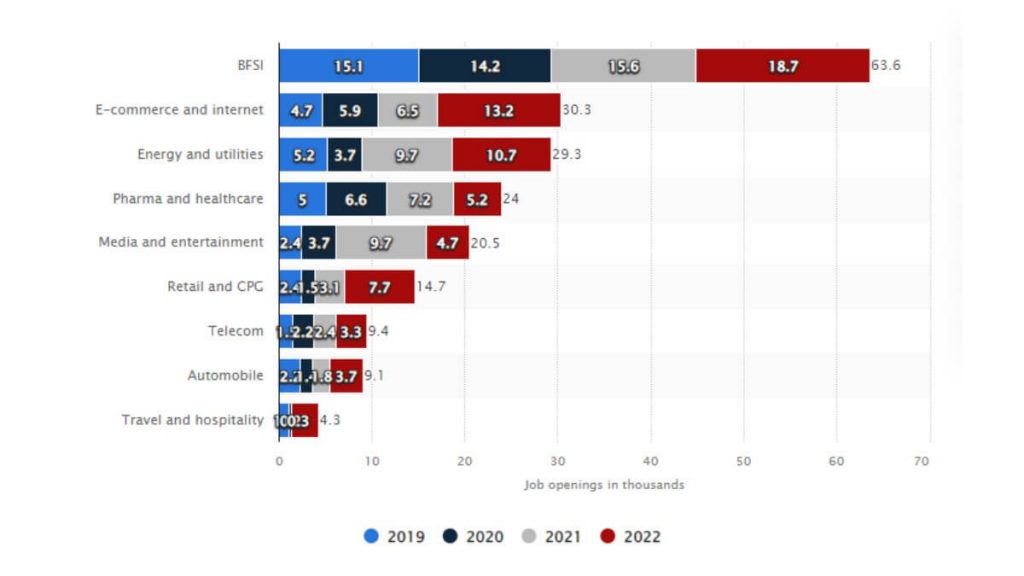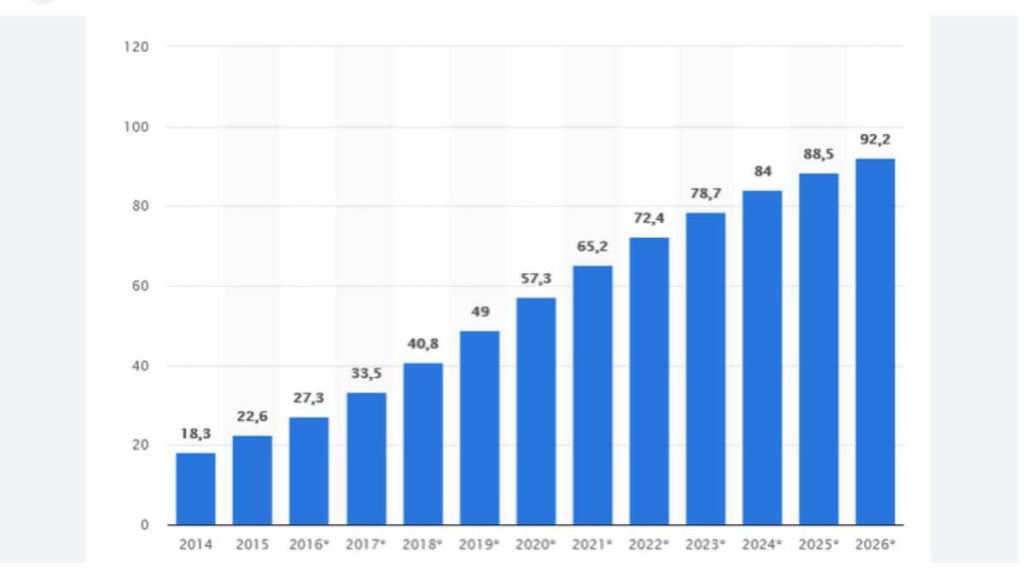Are you interested in a career in data science? The field is growing rapidly and the demand for skilled professionals is higher than ever. With the ability to analyze and interpret complex data sets, data scientists can help organizations make better-informed decisions and drive growth.
Whether you’re just starting out or looking to transition into the field, a career in data science offers a wide range of opportunities for those with the right skills and experience.
A career in data science is the right choice for several reasons. Firstly, it is a highly lucrative field with a growing demand for professionals. Data science is being used by organizations across all industries, which means there are many job opportunities available.
Secondly, it is a field that offers a high degree of job satisfaction as you will be solving complex problems and making a real impact on businesses and society.
Lastly, Data science is a field that is constantly evolving, with new technologies and methodologies emerging all the time. This means that there is always room for growth and learning in your career
With data science careers emerging and gaining more popularity in recent years, aspiring data scientists can wonder “Should I be a Data Scientist?” This article explores 13 reasons why you should choose a career in Data Science.
- Various roles in Data Science Career
- A Career in Data Science in India
- Starting salary in Data Science in India
- Job responsibilities of a Data Science Professional
- How should you prepare for a career in data science?
- Necessary skills required to become a Data Scientist
- How is the future of data science?
- How is the career growth in Data Science?
- Can I get a remote job in Data Science?
- Data Science job growth stats
- Leading employers in Data Science
- The growth & the boom
- Top Data Science Certifications to get you started
- Who can learn Data Science?
- High Demand for Professionals: Data science is becoming an essential function in various industries. With the increasing amount of data being generated and collected, organizations are turning to data scientists to help them make sense of it all. This need for skilled professionals is increasing, and it’s expected to grow in the future. This means that there will be a lot of job opportunities for data scientists.
- Lucrative Salaries: Data scientists are among the highest-paid professionals in the field. Salaries for data scientists tend to be higher than those for other IT professionals, and the earning potential only increases with experience. This is due to the high demand for data scientists, and the skills and knowledge they bring to the table.
- Job Satisfaction: A career in data science is challenging and stimulating. You will be solving complex problems and making a real impact on businesses and society. This type of work is highly rewarding and fulfilling. As a data scientist, you will be able to see the impact of your work on the organization and society as a whole.
- Constant Learning and Growth Opportunities: Data science is a field that is constantly evolving, with new technologies and methodologies emerging all the time. This means that there is always room for growth and learning in your career. As a data scientist, you will need to stay current with the latest tools, techniques, and methodologies in order to stay competitive in the field.
- Interdisciplinary Field: Data science is an interdisciplinary field, which means it draws on knowledge and skills from a variety of other fields, such as statistics, computer science, and business. This requires data scientists to have a diverse set of skills and knowledge, making the field challenging and stimulating.
- Impactful Work: Data science can be used to improve a wide range of industries and make a real difference in people’s lives. Data scientists can help organizations make better-informed decisions, improve their operations, and drive growth. It can also be used for social good, for example, in healthcare, education, and environmental conservation.
- Diverse Career Paths: Data science offers many opportunities for career advancement. Some data scientists work as analysts, while others may become managers or leaders in the field. With the right skills and experience, you can advance to a leadership role, manage a team of data scientists, or even start your own data science consulting company.
Various roles in Data Science Career
As data becomes more accessible and more people have access to powerful computing systems, there has been an increase in demand for professionals who can turn raw data into actionable insights.
This demand has fueled the growth of companies that specialize in collecting and analyzing large amounts of information, such as Google or Facebook.
These companies employ teams of data scientists whose job is to analyze this information along with other internal business data sources like customer purchase histories or employee performance reviews.
- Data Analyst: This role involves collecting, cleaning, and analyzing data to extract insights and inform business decisions. Data analysts are responsible for analyzing large data sets and identifying patterns and trends that can be used to improve business performance. They use a variety of tools and techniques, such as SQL and Excel, to manipulate data and create visualizations to communicate their findings to non-technical stakeholders.
- Data Engineer: This role involves designing and building the infrastructure and systems that collect, store, and process data. Data engineers are responsible for designing and maintaining the systems that store, process and retrieve data. They use technologies such as Hadoop, Spark, and NoSQL databases to build scalable and efficient data pipelines. They also design and implement security and privacy protocols to protect data.
- Machine Learning Engineer: This role involves developing and implementing machine learning models to solve specific business problems. Machine learning engineers are responsible for designing and implementing machine learning models that can be used to automate decision-making, predict outcomes, and identify patterns in data. They use technologies such as Python and R to develop models and work closely with data scientists to ensure that the models are accurate and reliable.
- Business Intelligence Analyst: This role involves using data to inform business decisions and strategy. Business intelligence analysts are responsible for creating reports and visualizations that provide insights into business performance. They use tools such as Tableau and Power BI to create dashboards and reports that provide real-time insights into key business metrics.
- Data Visualization Specialist: This role involves creating visual representations of data to help communicate insights to non-technical stakeholders. Data visualization specialists are responsible for creating visualizations that make it easy for stakeholders to understand complex data. They use tools such as D3.js, Tableau, and Power BI to create interactive and engaging visualizations that communicate data insights clearly.
- Data Scientist: This role involves using a variety of tools and techniques to extract insights from data and communicate those insights to stakeholders. Data scientists are responsible for analyzing large data sets to identify patterns and trends that can be used to improve business performance. They use tools such as Python, R, and SQL to manipulate data and create models that can be used to make predictions and automate decision-making.
- Data Architect: This role involves designing and managing the overall data architecture of an organization, including data storage, processing, and security. Data architects are responsible for designing and implementing the systems and processes that manage an organization’s data. They use technologies such as Hadoop, Spark, and NoSQL databases to design scalable and efficient data architectures that can handle large data sets.
- Big Data Engineer: This role involves designing and implementing systems to process and analyze large data sets. Big data engineers are responsible for designing and implementing systems that can handle the large volume, variety, and velocity of data that organizations generate. They use technologies such as Hadoop, Spark, and NoSQL databases to build scalable and efficient data pipelines.
- Deep Learning Engineer: This role involves developing and implementing deep learning models, which are a specific type of machine learning model. Deep Learning Engineers are responsible for developing and implementing deep learning models that can be used to automate decision-making, predict outcomes, and identify patterns in data. They use technologies such as TensorFlow, Keras, and Pytorch to develop models and work closely with data scientists to ensure that the models are accurate and reliable.
- Data Governance Analyst: This role involves creating and implementing policies and procedures to ensure the quality, security, and compliance of an organization’s data. Data governance analysts are responsible for ensuring that an organization’s data is accurate, consistent, and secure.
A Career in Data Science in India
A career in data science in India is a rapidly growing field with many growth opportunities and it is necessary to enhance your Data Science Skills to get the ideal opportunity. Companies in a wide range of industries, including technology, finance, healthcare, and retail, need professionals with data science skills to help them make data-driven decisions.
Data scientists in India typically start their careers as data analysts or data engineers and then progress to more senior roles such as data scientists or data science managers. As they gain experience, they may also take on leadership roles such as head of data science or chief data officer.
To advance in a career in data science in India, it is important to stay current with the latest technologies and techniques in the field. This may include learning new programming languages, such as Python or R, and becoming proficient in tools such as machine learning libraries and big data platforms.
Additionally, data scientists should also develop strong problem-solving and communication skills in order to effectively work with cross-functional teams and present data-driven insights to non-technical stakeholders.
Starting salary in Data Science in India
| Position | Average Salary (INR) |
|---|---|
| Data Analyst | 5-8 LPA |
| Data Engineer | 7-12 LPA |
| Machine Learning Engineer | 8-15 LPA |
| Business Intelligence Analyst | 6-10 LPA |
| Data Visualization Specialist | 6-10 LPA |
| Data Scientist | 10-20 LPA |
| Data Architect | 12-20 LPA |
| Big Data Engineer | 8-15 LPA |
| Deep Learning Engineer | 8-15 LPA |
| Data Governance Analyst | 6-10 LPA |
Job responsibilities of a Data Science Professional
- Collect and clean data: This involves acquiring data from various sources, such as databases, APIs, and external sources, and cleaning and preparing the data for analysis. This may involve tasks such as identifying and removing outliers, filling in missing data, and transforming data into a format that can be used for analysis. Data cleaning is a crucial step in data science as poor-quality data can lead to inaccurate conclusions and predictions.
- Analyze data: This involves using a variety of tools and techniques, such as statistical analysis, machine learning, and data visualization, to extract insights from data. This includes tasks such as identifying patterns and trends, building predictive models, and testing hypotheses. Data scientists use their analytical skills to turn raw data into actionable insights that can be used to inform business decisions.
- Communicate findings: This involves presenting findings to non-technical stakeholders, such as managers and executives, in a clear and concise manner. This may involve creating reports, presentations, and visualizations that effectively communicate complex data insights to a non-technical audience. Being able to effectively communicate findings is a key skill for data scientists as it allows them to share their insights with others and drive decision-making.
- Build predictive models: This involves using machine learning and statistical techniques to build models that can predict future outcomes. This can include tasks such as selecting the appropriate model, training and testing the model and fine-tuning its parameters. Data scientists use predictive models to make predictions about future events, such as customer behavior or financial performance.
- Create data visualizations: This involves creating visual representations of data, such as charts and graphs, to help communicate insights to non-technical stakeholders. Data visualization is an important aspect of data science as it allows data scientists to present their findings in a way that is easy to understand and communicate.
- Collaborate with other teams: This involves working closely with other teams, such as software engineers, product managers, and business analysts, to ensure that data science efforts are aligned with the overall goals and strategy of the organization. This includes working with cross-functional teams to identify new opportunities to apply data science to solve business problems.
- Stay current with the latest technologies and methodologies: This involves staying up-to-date with the latest tools, techniques, and methodologies in data science, such as new machine learning algorithms or data visualization techniques. This allows data scientists to stay ahead of the curve and leverage the latest technologies to improve their work.
- Develop and maintain data infrastructure: This involves designing and maintaining the systems and processes that collect, store, and process data. This includes designing and implementing data pipelines, data storage solutions, and data processing tools.
- Ensure data quality and security: This involves implementing policies and procedures to ensure the quality, security, and compliance of an organization’s data. This includes tasks such as data validation, data auditing, and data encryption. Data Governance is crucial for ensuring that data is accurate, reliable, and secure.
- Participate in research and development: This involves participating in research and development activities to identify new opportunities to apply data science to solve business problems. This can include tasks such as identifying new data sources, experimenting with new machine learning algorithms, and staying current with the latest research in the field of data science.
How should you prepare for a career in data science?
To prepare for a career in Data Science, you simply have to get your perspective set on Data and the related skills. A career in data science requires a combination of technical skills and domain knowledge, as well as strong problem-solving and communication abilities. Some of these skills and abilities are listed below which you should develop while learning data science.
- Develop your technical skills: Data science is a highly technical field that requires a solid understanding of math and statistics, as well as programming languages such as Python and R. To develop your technical skills, you can start by taking online courses or earning a degree in a related field such as computer science, statistics, or mathematics. These types of educational programs will provide you with a strong foundation in the theory and concepts of data science and equip you with the necessary skills to analyze and interpret data. Additionally, you should also focus on developing your programming skills and familiarizing yourself with popular data science libraries and frameworks.
- Learn the tools of the trade: In addition to developing your technical skills, it’s important to familiarize yourself with the tools that data scientists use on a daily basis. These tools include machine learning libraries (e.g. scikit-learn, TensorFlow), big data platforms (e.g. Hadoop, Spark), and data visualization tools (e.g. Tableau, Matplotlib). By mastering these tools, you’ll be able to efficiently work with large datasets and create compelling visualizations to communicate your findings.
- Gain experience: One of the best ways to prepare for a career in data science is by gaining real-world experience. You can participate in data science competitions and hackathons, or work on personal projects to build a portfolio of work that demonstrates your skills and experience. Additionally, you can also look for internships or entry-level positions at companies that are involved in data science, this will help you to get hands-on experience and also be able to add it to your resume.
- Network: Attending meetups and conferences in the data science field is a great way to meet other data scientists and learn about the latest developments and trends in the industry. Additionally, networking allows you to build relationships with professionals in the field, which can help you to find job opportunities and stay current with the latest trends and technologies.
- Specialize: Data science is a broad field, and it can be beneficial to specialize in a specific area. Identify a specific area of data science that interests you, such as Natural Language Processing, Computer Vision, Reinforcement Learning, etc, and focus on developing skills in that area. Specializing will help you to stand out in the job market and give you an edge over other candidates with more general data science skills.
- Develop soft skills: Data science also requires strong problem-solving, communication, and teamwork skills. As a data scientist, you will be working with a cross-functional team and need to communicate your findings to non-technical stakeholders, it is important to develop your soft skills to be able to effectively communicate and collaborate with others.
- Stay up-to-date: The field of data science is constantly evolving, with new technologies, techniques, and best practices emerging all the time. It’s important to stay current with these developments by reading industry publications, attending conferences, and following thought leaders on social media. This will help you to stay ahead of the curve and be prepared for new opportunities and challenges in the field.
Necessary skills required to become a Data Scientist
There are several skills that are necessary for a career in data science. Some of the most important skills include:
- Programming: Data scientists need to have a strong foundation in programming languages such as Python, R, and SQL. These languages are used to write code to collect, clean, and analyze data, as well as to build and deploy machine learning models.
- Math and statistics: Data science is heavily based on math and statistics, so a solid understanding of concepts such as probability, statistics, linear algebra, and calculus is essential.
- Machine learning: Data scientists use a wide range of machine learning algorithms and techniques to analyze data and make predictions. Therefore, a strong understanding of machine learning concepts, including supervised and unsupervised learning, is essential.
- Data visualization: Data visualization is an important skill in data science, as it allows data scientists to communicate their findings in an easy-to-understand format. Familiarity with tools such as Tableau, Matplotlib, and ggplot is helpful.
- Data wrangling: Data scientists often work with large and complex datasets, so they need to be able to clean, organize, and manipulate data in order to make it ready for analysis. Knowledge of tools such as Pandas and dplyr is necessary.
- Data exploration and analysis: Data scientists need to be able to explore and analyze data in order to uncover insights and patterns. This requires knowledge of techniques such as data exploration, hypothesis testing, and statistical modeling.
- Communication: Data scientists need to be able to communicate their findings to both technical and non-technical stakeholders, so strong communication skills are essential.
- Domain Knowledge: Knowledge of the domain or industry in which the data science is being applied is important as it allows data scientists to understand the context and make sense of the data.
How is the future of data science?
The future of data science is expected to be very promising, as the demand for data science professionals continues to grow. Some of the key trends and developments in the field that are expected to shape the future of data science include:
- Advancements in AI and machine learning: With the continued advancements in AI and machine learning, data scientists will be able to analyze and interpret data more quickly and accurately. This will enable organizations to make more informed decisions and improve their operations.
- Increased adoption of big data technologies: The amount of data being generated is increasing rapidly, and organizations will continue to adopt big data technologies such as Hadoop and Spark to manage and analyze this data.
- Greater focus on explainability and interpretability: As the use of AI and machine learning becomes more widespread, there will be a greater focus on explainability and interpretability, to ensure that the decisions made by these systems are transparent and can be understood by humans.
- More emphasis on data privacy and security: With the increasing amount of data being collected and stored, there will be a greater emphasis on data privacy and security to protect sensitive information and prevent data breaches.
- The emergence of new fields: The field of data science is constantly evolving, and new fields such as reinforcement learning, deep learning, and computer vision will become more prevalent.
- More Interdisciplinary: With data science becoming more prevalent, it’s going to be used more in interdisciplinary fields such as healthcare, finance, transportation, education, and many more.
Overall, the future of data science is expected to be characterized by continued advancements in technology and an increased focus on the ethical and societal implications of data science. With the increasing amount of data being generated, data science will play an increasingly important role in decision-making in various fields and industries.
How is the career growth in Data Science?

Career growth in data science can take many forms and can vary depending on an individual’s interests, skills, and experience. Some common career growth paths in data science include:
- Moving up the management ladder: As data scientists gain experience and demonstrate their ability to lead projects and teams, they may be promoted to management roles such as data science team lead, manager, or director.
- Specializing in a specific area: Data science is a broad field, and as data scientists gain more experience, they may choose to specialize in a specific area such as natural language processing, computer vision, or reinforcement learning.
- Developing expertise in a specific industry: Data scientists may also choose to focus on a specific industry such as healthcare, finance, or retail, and develop expertise in the data and techniques specific to that industry.
- Becoming a consultant or freelancer: Data scientists with strong communication skills and a deep understanding of the business may choose to become a consultant or freelancer, working with multiple clients on a project basis.
- Starting their own company: Data scientists with an entrepreneurial spirit may choose to start their own company and build a business around data science and analytics.
- Continuing education: Data science is a field that is constantly evolving, and data scientists should be willing to continue learning and updating their skills to stay current with the latest technologies and best practices.
Ultimately, your growth in a career in data science depends on your individual interests, skills, and experience. Data scientists can choose to specialize in a specific area, move up the management ladder, or start their own company. With the increasing demand for data science professionals, the possibilities for career growth in data science are vast.
Can I get a remote job in Data Science?
Yes, it is possible to find a remote job in data science. With the rise of remote work, many companies are now offering data science positions that can be done remotely. These positions may include roles such as data analysts, data engineers, and data scientists.
You can find remote data science job openings by looking for job postings on job boards such as LinkedIn, Indeed, and Glassdoor. Many companies and startups are open to remote working and post their job opening on these platforms. You can also check out websites such as Remote.co and WeWorkRemotely.com, which list remote job openings across various industries, including data science.
It’s important to note that while remote data science jobs are available, they may be more competitive than on-site jobs, as more people have the option to work remotely. To increase your chances of getting a remote data science job, it’s a good idea to have a strong portfolio of work, relevant certifications, and experience in the field. It’s also important to be able to demonstrate that you are self-motivated, disciplined, and able to work independently, which are important qualities for remote work.
Overall, it’s possible to find a remote job in data science, but it may take a bit more effort and research to find the right job for you. It’s important to keep in mind that having a strong resume, portfolio and skillset will increase your chances of getting hired for a remote data science job.
Data Science job growth stats

According to recent studies and reports, the demand for data science professionals is growing rapidly. Here are some data science job growth stats:
- According to a report by Indeed Hiring Lab, data science is the number one job in the United States in terms of salary, number of job openings, and year-over-year growth.
- According to a report by LinkedIn, data science and analytics is one of the top emerging jobs in India, with a YoY growth rate of over 35%.
- According to the US Bureau of Labor Statistics, Data scientist jobs are predicted to grow by 36% between 2021 to 2031.
- This profile is expected to create 11 million jobs by 2026.
The number of job posts for data scientists in India has increased by 29%. However, due to a lack of awareness about the employment opportunities in data science, only roughly 127 diploma institutions and 663 undergraduate colleges offer these new courses. Surprisingly, this represents only 10% of the country’s total institutes.
By 2026, the global demand for data scientists might increase by a staggering 200%. In the next five years, India will have more than 11 million data science job openings, according to analysts.
Leading employers in Data Science
Accenture, IBM India, Flipkart, Capgemini, and JP Morgan, among others, are some of the prominent firms with the biggest number of analytics employment. In addition to an increase in analytics and data science positions in 2022, these organizations also saw an increase in advertising jobs.
The research also highlighted a few additional significant patterns. Bengaluru was the major hub for analytics and data science experts for the fifth consecutive year, accounting for 28.5% of the market with 51,149 vacant positions. It was followed by Mumbai and Delhi NCR.
“Employees are returning to the work at a faster rate than in other cities,” the report stated.
The growth & the boom

In 2022, the number of available positions requiring five to ten years of experience increased by a factor of 1.5 (70,380), compared to 2021 (40,870). Moreover, the number of advertised available positions with a salary range of 25-50 lakh increased the most year-over-year, from 3,585 in 2021 to 18,776 in 2022.
While those earning over 50,000,000 increased from 276 in 2021 to 5,472 in 2022. Almost one-third (31.2%) of these available positions were for engineering undergraduates, while one-fourth (24.1%) were for data engineers.
Top Data Science Certifications to get you started

There are several data science certifications that can help you to develop the skills and knowledge needed for a career in the field. Some of the top data science certifications include:
- IBM Data Science Professional Certification
- Microsoft Certified: Azure Data Scientist Associate
- Google Analytics Academy – Google Analytics for Beginners
- Data Science Methodology
- Data Science Essentials – Microsoft
- Introduction to Data Science in Python
- Understanding Data Science
These are some of the top data science certifications that are widely recognized by employers and can help to demonstrate your knowledge and skills in the field. It is important to note that for most of the certifications mentioned above, having work experience in the field and a strong mathematical and statistical background are prerequisites to qualify for the certification.
Who can learn Data Science?
Anyone can build a career in Data science. It can be learned by anyone who has an interest in the field and is willing to put in the time and effort to develop the necessary skills. However, there are certain prerequisites that can be helpful for learning data science:
- Strong analytical skills: Data science involves analyzing large amounts of data and making sense of it, so having strong analytical skills is important.
- Strong math and statistics background: Data science is heavily based on math and statistics, so a strong foundation in these subjects can be helpful.
- Programming skills: Data science involves working with code and data, so having programming skills in languages such as Python, R, or SQL is essential.
- Strong problem-solving skills: Data science involves solving complex problems, so having strong problem-solving skills is important.
- Basic understanding of machine learning: Machine learning is an important part of data science, so having a basic understanding of machine learning concepts and algorithms can be helpful.
- Basic knowledge of databases: Data scientists need to be able to work with databases and understand SQL, so a basic understanding of databases can be helpful.
- Strong curiosity and willingness to learn: Data science is a field that is constantly evolving, so having a strong curiosity and willingness to learn new techniques, technologies, and approaches is important.
It’s important to note that data science can be learned by anyone who has the dedication and interest to pursue it. Some people may have a background in computer science, math, or statistics, while others may come from a completely different field, but they all can learn data science and advance in their careers. There are many online resources, tutorials, and degree programs available to help individuals learn data science, so it’s a good idea to explore these options and find the one that best suits your needs and learning style.

13+ Yrs Experienced Career Counsellor & Skill Development Trainer | Educator | Digital & Content Strategist. Helping freshers and graduates make sound career choices through practical consultation. Guest faculty and Digital Marketing trainer working on building a skill development brand in Softspace Solutions. A passionate writer in core technical topics related to career growth.




